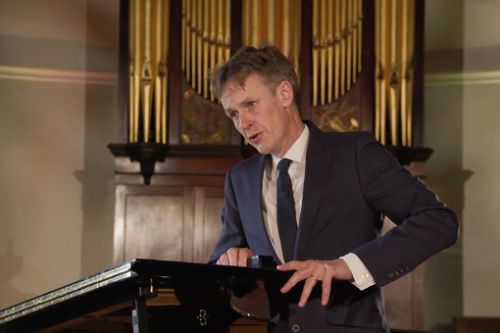
 United Kingdom Oxford Lieder Festival [1]: The Western-Eastern Divan – Schubert, Henze, Wolf, Mahler: Ian Bostridge (tenor), Julius Drake (piano), Holywell Music Room, Oxford (live stream), 11.10.2020. (CS)
United Kingdom Oxford Lieder Festival [1]: The Western-Eastern Divan – Schubert, Henze, Wolf, Mahler: Ian Bostridge (tenor), Julius Drake (piano), Holywell Music Room, Oxford (live stream), 11.10.2020. (CS)

Schubert – ‘Geheimes’; ‘Im Jänner 1817 Tiefes Leidí’; ‘An Silvia’; ‘Totengräbers Heimweh’; ‘Die Wallfahrt’; ‘Greisengesang’; ‘Lachen und Weinen’; ‘Dass sie hier gewesen’; ‘Du bist die Ruh’; ‘Sei mir gegrüsst’
Henze – from Sechs Gesänge aus dem Arabischen; iv. ‘Casarion’, vi. ‘Das Paradies’
Wolf – ‘Phänomen’; ‘Wie sollt ich heiter bleiben’; ‘Wenn ich dein gedenke Komm’; ‘Liebchen, komm’
Mahler – Rückert-Lieder: 1. ‘Blicke mir nicht in die Lieder!’; 2. ‘Liebst du um Schönheit’; 3. ‘Ich atmet’ einen linden Duft’; 4. ‘Ich bin der Welt abhanden gekommen’
The second day of the 2020 Oxford Lieder Festival focused on the 14th-century Persian poet, Hafez (c. 1315-?1390): his reception, and the influence his poetry has had on western culture, both literature and art-song, across the centuries. A day of study events and recitals – soprano Soraya Mafi, tenor Joshua Mills, baritone Roderick Williams, bass-baritone Michael Mofidian, pianists Andrew West, Sholto Kynoch and Jâms Coleman, and harpsichordist Julian Perkins – culminated in a performance of Iranian classical songs by the ensemble The Voice of Santur. But, that final celebration of traditional and contemporary settings of Hafez, accompanied by violin, santur, tabla and qanun, was preceded by a recital in Holywell Music Room by tenor Ian Bostridge – the 2020 Festival’s artist-in-residence – and pianist Julius Drake.
In German literature, the name of Hafez is closely associated with that of Johann Wolfgang von Goethe. Goethe discovered the verses of Hafez in 1814, and his fifteen-book West-östlicher Divan – ‘divan’ is Arabic for ‘collection of poems’ – published in 1819 confirms his affinity with his Persian predecessor, Goethe’s ebullient and sensuous dialogues, and exuberant drinking songs, forging ‘connections’ across time and cultures.
It was with one of Franz Schubert’s settings from ‘The Book of Love’ in the West-östlicher Divan that the recital began. A feature of this year’s Festival is that each evening recital commences with a short group of Schubert songs performed by ‘emerging artists’ – young singers who have begun forging successful careers in the last few years, but who have been very hard hit by the crisis in the performing arts caused by the pandemic. As so, ‘Geheimes’ (A Secret) was the first in a sequence of four Schubert songs performed by mezzo-soprano Fleur Barron. It was elegantly phrased, but Barron’s opulent tone and colour intimated the urgent passions of the poetic text, aided by the conspiratorial breathlessness of Drake’s pulsing accompaniment which surged and shrank with barely restrained excitement.
I hear more restlessness in ‘Im Jänner 1817 – Tiefes Leid’, and sense the syncopations trembling more tensely; after all, the song begins in bewilderment and despair, “Ich bin von aller Ruh geschieden/ Ich treib’ umher auf wilder Flut” (All peace has forsaken me; I am tossed upon the stormy waters.). ‘An Sylvia’ had a lovely grace, though, with Drake providing complementary vigour, the strong dotted rhythms of the final stanza embodying the hyperbolic exaltation’s of the text: “Jeden Reiz besiegt sie lang, / Den Erde kann gewähren” (She excels each mortal thing / Upon the dull earth dwelling). Concluding the sequence, ‘Totengräbers Heimweh’ (Gravedigger’s Longing) was terrifyingly tense and theatrical. Barron’s controlled shaping of the fragmented repetitions – “O Leben! – Was soll’s? O was soll’s? (O life! – To what end – oh what end?!) – was gripping, and with wonderfully rich glossiness her mezzo sank down into the nether regions, “Und starre mit sehnendem Blick, / Hinab – ins tiefe Grab!” (And stare longingly Down – into the deep grave!). The final lines, when the poet-speaker closes his eyes and submits, in relief, to death, had a transcendent quality that lingered in Drake’s final chord, which resonated long and deep.
Some of the most admired, and most elegant, German translations of Hafez came from the pen of Goethe’s contemporary, Friedrich Rückert, and it was settings of Rückert that Ian Bostridge selected for his own Schubert sequence. Both ‘Die Wallfahrt’ (The Pilgrimage) and ‘Greisengesang’ (Song of Old Age) lie low in register and have a sombre tone. In the former, the dark strength of Bostridge’s low voice made the brief but bleak sentiments tell, while in the latter he exploited the contrast between reality and memory – the wintery coldness of the end of life cannot quite extinguish the remembered flush and warmth of youth – with contrasts of vocal colour and impetus. The text was delivered with characteristic immediacy, and the fragility of the retreat in which consolation is found – “Schleuss aus den rauhen Odem der Wirklichkeit,/ Und nur dem Duft der Träume gib Dach und Fach!“ (Shut out the harsh breath of reality and give shelter only to the fragrance of dreams!) – was cruelly undermined by the riposte of the piano’s final assertions.
The carefree simplicity of ‘Lachen und Weinen’ (Laughter and Tears) had a bittersweet tang, while the piano’s tender but tentative rocking in ‘Du bist die Ruh’ troubled the peace which the voice proclaims. The climactic consummation, “Dies Augenzelt von deinem Glanz/ Allein erhellt, O füll es ganz!” (This temple of my eyes is lit by your radiance alone, O fill it utterly!) rose with strained urgency, only to be snatched away, leaving the conviction suspended in the air, determined but vulnerable. The sequence ended with an expansive rendition of ‘Sei mir gegrüßt’ (I greet you), in which Bostridge clipped the repeated declarations, “Sei mir gegrüsst! Sei mir geküsst!” (I greet you! I kiss you!) as if to deny the expressions of fulfilment. Best of all was ‘Dass sie hier gewesen’ (That she has been here): this is the sort of unstable, elusive lied, which ebbs and flows with charged restlessness, that Bostridge sings with such wonderful immediacy, entering the protagonist’s emotional landscape – its scents, schisms and self-deceptions – with compelling realism.
After hearing Ian Bostridge perform his Three Auden Songs – in his debut recital, with Drake, at the Aldeburgh Festival in 1996 – Hans Werner Henze decided to compose a new work for the tenor: the result was Sechs Gesänge aus dem Arabischen (Six Songs from the Arabian). For the first five songs Henze wrote his own texts, which he described as ‘occidento-oriental’ in flavour, drawing on A Thousand and One Nights, Goethe’s West-östlicher Divan and Rimbaud; the final song, ‘Das Paradies’, sets one of Rückert’s translations of Hafez.
I’m not entirely convinced by either the texts or the score of these ‘Arabian’ songs, and find it difficult to ‘connect’ the words and music, but Bostridge and Drake performed the fourth song, ‘Cäsarion’ (Caesarion) and the final Rückert setting with absolute conviction and expressive power. The evocation of the tragic fate and transcendence of Cäsarion, the doomed son of Julius Caesar and Cleopatra, whose body is washed up on a distant shore, was dramatic and intense, Bostridge taking great pains to paint the text and communicate the narrative – sometimes whispering, almost speaking, elsewhere bending the melodic line with piercing poignancy. The piano’s transparent textures conjured both the sculpting of the two ivory flutes from the boy’s clavicle and the instruments’ ‘chirping, whimpering … cicadas’ song’, and if I could make no sense of the long piano postlude then that wasn’t Drake’s fault! The lyricism of the poet-speaker’s longing for sublime union with the moon, and transfiguration, in ‘Das Paradies’ was more directly affecting, as Bostridge shaped the drawn-out vocal phrases smoothly and with unwavering intensity. The final appeal, “reiche mir die Hand”, drifted, frail but fervent, into infinity.
Four of Hugo Wolf’s Goethe-Lieder, settings of poems from the West-östlicher Divan, followed. Tremulous with wonder and hopefulness, the beautiful motifs of ‘Phänomen’ (Phenomenon) slipped ineffably, almost deliriously, through a rainbow of harmonies. ‘Wie sollt ich heiter bleiben’ (How could I remain cheerful?) was quizzical, lilting somewhat haltingly until the poet’s self-reassuring, “Gedenke!” (Remember) – a floating rise conveying restored conviction. The performers conveyed the languorous inscrutability of ‘Wenn ich dein Gedenke’ (When I think of you), while the protagonist of ‘Komm, Liebchen, Komm’, who asks his beloved to wind his jewelled turban about his brow, worked himself up to an audacious exultation of his own majesty, Bostridge pushing his tenor to the climactic peak as Drake’s rolling triplets gathered steam in the piano’s declamatory after-word.
We returned to Rückert for the final items, four of Mahler’s Rückert-Lieder (‘Um Mitternacht’ was omitted). Drake’s fingers raced lightly through ‘Blicke mir nicht in die Lieder!’ (Do not look into my songs), which had an urgent immediacy that seemed to embody the act of creation of which the poem tells. Bostridge treated the rhythm of ‘Liebst du um Schönheit’ with extraordinary freedom, and while the vocal line was beautifully coaxing, I felt that the ‘choppiness’ of the pulse and unpredictability of the rhythm weakened the effect of Mahler’s elongation of the high-lying words ‘liebe’ and ‘immer’ in the final stanza, through which the ‘certainty’ – the faith in a Love which exists for its own sake – that is the song’s essence is confirmed. In ‘Ich atmet’ einen linden Duft!’ (I breathed a gentle fragrance!), Drake’s steady stream of quavers evoked the piquant presence of the scent floating from the spray of lime. Bostridge spun the long lines is a calm, gentle pianissimo, but had a tendency to cut short the long, held notes that close each phrase, sometimes quite markedly so. ‘Ich bin der Welt abhanden gekommen’ (I am lost to the world) brought the recital to a close in otherworldly quietude.
Claire Seymour